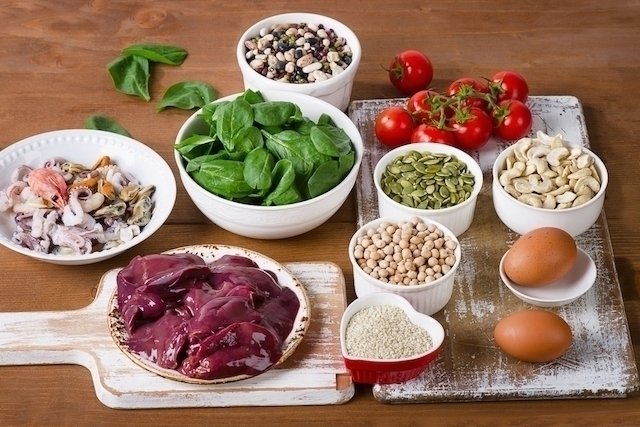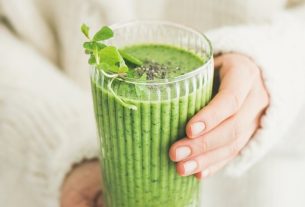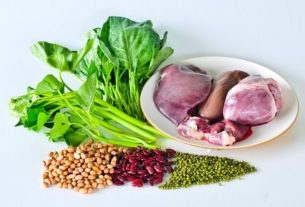To improve iron absorption in the intestine, strategies should be used such as eating citrus fruits, such as orange, pineapple, guava and acerola, along with foods rich in iron and avoiding frequent use of antacid medications, as iron absorption occurs. better in acidic environment.
Iron absorption is easier when it is in the “heme” form, which is present in foods of animal origin such as meat, liver and egg yolks. Some foods of plant origin, such as tofu, cabbage and beans, also contain iron, but it is of the non-heme type, which the intestine absorbs, but in smaller quantities.
Therefore, in addition to eating foods rich in vitamin C, it is important that foods that are sources of iron of plant and animal origin are included in your daily diet so that you have ideal amounts of iron in your body.

Some of the main tips that can help increase iron absorption in the body are:
1. Increase your consumption of foods rich in vitamin C
Taking an iron supplement or consuming a food source of iron together with foods rich in vitamin C helps to increase the absorption of iron in the body, as vitamin C acts as a facilitator, favoring the bioavailability of the iron ingested.
Therefore, it is recommended that the iron supplement or food source of this mineral be ingested together with acerola or orange juice, guava, or even salads, since many vegetables, such as tomatoes, lettuce and arugula are also sources. of vitamin C. Check out a list of foods rich in vitamin C.
2. Eat a diet rich in iron
To have a greater absorption of iron in the body, it is also important to increase the consumption of foods rich in this mineral, such as red meat, shellfish, tuna, spinach, broccoli and pumpkin seeds, for example. Discover other foods rich in iron.
Furthermore, it is important that the amount of iron-rich foods is indicated by a nutritionist, to ensure adequate iron absorption. This is because only 5% of the iron present in foods of plant origin and up to 30% of the iron present in foods of animal origin are absorbed by the body.
3. Avoid excessive consumption of milk and dairy products
To increase iron absorption, it is recommended to avoid excessive consumption of milk and dairy products, such as yogurt and cheese. Likewise, you should avoid eating these foods together with iron-rich foods or supplements, as calcium decreases the absorption of iron in the intestine.
4. Take probiotics
Consuming probiotics is also important to increase iron absorption, as probiotics help keep the intestinal flora balanced, facilitating the absorption of nutrients, including iron. Furthermore, probiotics also help prevent some side effects of taking iron supplements, especially constipation.
Therefore, it is recommended that the consumption of probiotic foods, such as kefir, natural yogurt or fermented milk, be part of your daily routine. The use of probiotic supplements, recommended by a nutritionist, may also be interesting. This way it is possible not only to promote the absorption of iron, other vitamins and minerals, but also to improve the immune system and facilitate digestion. See more about probiotics and their health benefits.
5. Avoid using antacid medications
Antacid medications, such as magnesium hydroxide, calcium carbonate, sodium bicarbonate, or magnesium hydroxide, neutralize stomach acid, decreasing the absorption of iron from food or supplements. To help with the absorption of the mineral and combat anemia, it is important to avoid using antacids, as iron needs stomach acid to be absorbed.
Bibliography
- CLINICAL PROTOCOL AND THERAPEUTIC GUIDELINES. Iron deficiency anemia. 2014. Available at: <https://portalarquivos.saude.gov.br/images/pdf/2014/dezembro/15/Anemia-por-Defici–ncia-de-Ferro.pdf>. Accessed on 01 Sep 2021

Sign up for our newsletter and stay up to date with exclusive news
that can transform your routine!
Warning: Undefined array key "title" in /home/storelat/public_html/wp-content/plugins/link-whisper-premium/templates/frontend/related-posts.php on line 12
Warning: Undefined array key "title_tag" in /home/storelat/public_html/wp-content/plugins/link-whisper-premium/templates/frontend/related-posts.php on line 13



